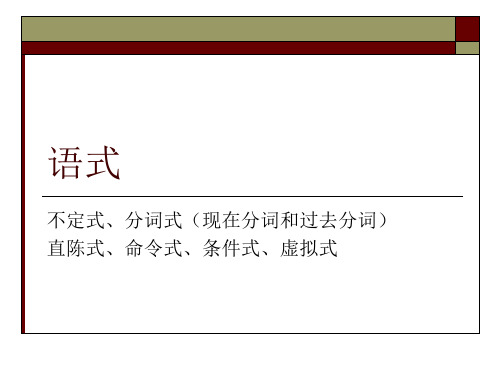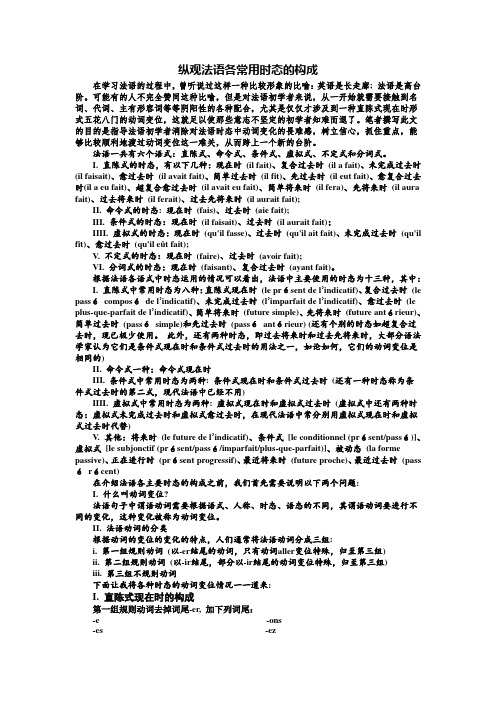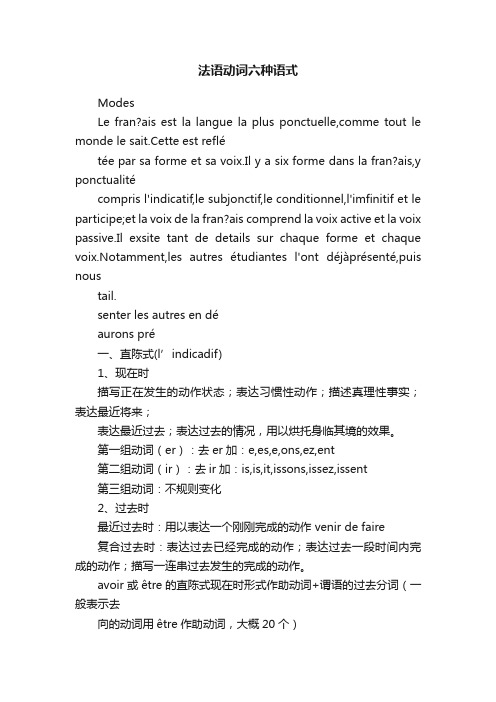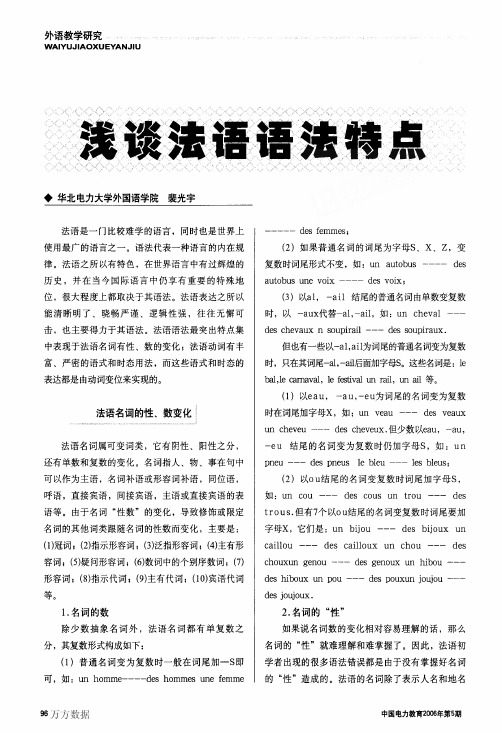条件式,直陈式
常用法语时态汇总

常用法语时态大全一、直陈式 Indicatif1、现在时 le present描写发生的动作或状态,表达习惯性动作,描述真理L'eau gèle à 0°C,分析作品Dans Le père Goriot, Balzac peint un amour paternel passionné.用在以si引导的假设从句里→Ce tt e plage est belle. Si tu l'aime, tu peux prendre des photos. 2、 复合过去时 Passé Composé表示过去一定时刻完成的动作→Napoléon est né en Corse en 1769.连续的事件→Après le rendez-vous, j'ai quitté le restaurant et tout à coup, j'ai vu mon père. (连续事件常用一些时间副词强调:alors, puis, ensuite, après, tout à coup, etc.)重复性→J'ai vu ce film 4 fois.有限的延续→Elle a fait son choix en 5 minutes.表示一个延续到现在时刻已完成的动作→Ils ont acheté une grande maison: ils ont beaucoup de travaux à y faire.复合过去时与未完成过去时区别:动作都发生在过去,表示已经发生且完成了的用复合过去时;表示延续的,正在进行的,不知道何时结束的用未完成过去时。
Je lisais quand elle est entrée dans mon bureau.若两个动作都表示正在进行,延续着,那么都使用未完成过去时。
法语语式和时态(一)

prendre voir
mettre partir pleuvoir
pris vu
mis parti plu
lire vouloir
pouvoir recevoir savoir
lu voulu
pu reçu su
falloir attendre
sortir suivre venir
fallu attendu
★ 注:以être为助动词的不及物动词在作及物动词使用时,助动词用avoir: J’ai monté ma valise dans le train. (及物动词) 我把旅行箱搬上了火车。 Je suis monté dans le train. (不及物动词) 我上了火车。
J’ai passé mes vacances d’ été dans le sud. (及物动词)
Le socialisme est supérieur au capitalisme. 社会主义比资本主义优越。
表示说话时正在发生的事情,这一用法与英语不同: Ne sortez pas, il plepassé composé):表示过去发生的动作,或从现在的角度看,已经完 成的动作。复合过去时是一种复合时态,由avoir或être的现在时+过去分词构成。 ★过去分词是从动词不定式变化而来的一种动词形式,它可以与助动词(avoir或être) 结合在一起,构成法语的复合时态。过去分词的构成如下: 第一组动词:词根加é parler(说话,讲话) —— parlé 第二组动词:词根加i finir (完成,结束)—— fini 第三组动词变化不规则,需逐个记忆,如: 动词不定式 过去分词 avoir être eu été 动词不定式 devoir dire 过去分词 dû dit 动词不定式 écrire faire 过去分词 écrit fait
法语语式

-
过去某一点做完了的事: 复合过去时更倾向于表 示动作的完成,而未完成过去时表示过去的状态 的描述。我们在表述现在时Il mange的时候,其 实是分动作和状态的。(状态:他吃着呢。 动作 他吃饭) 未完成过去式和复合过去时其实是两种 和现在时的对应。 如果则两件事都是发生在过去, 就应该这样表述 1.他那时正吃着饭呢 Il mangeait. 2.他已经吃过饭了 Il a mangé. 例句一,表示过去 状态的描述,是一种过去正在进行的动作,用未 完成过去时。例句二,表示过去动作的完成,用 复合过去时。
未完成过去时: 1.相当于英语的过去进行时was doing:过去正在 做的事 2.相当于英语的used to do:过去经常做的事 3.用于背景描写:比如从前有座山,山上有座庙 复合过去时: 1.相当于英语的一般过去式。 2.相当于英语的现在完成时。
注:
Je lisais quand elle est entrée dans mon bureau. Elle avait deux ans quand sa mère est morte. 她母亲去世时,她才两岁。(去世是完成的动作, 两岁是状态) Il faisait très chaud, elle a mis une robe. 天非常热,她穿上了裙子。 (穿裙子是动作,天热是描述动作发生的背景) 若两个动作都表示正在进行,延续着,那么都使 用未完成过去时: Le bébédormait et, pendant ce temps, je préparais le dî ner.
直陈式
现在时 复合过去时 未完成过去时 +过去分词 愈过去时 简单过去时 先过去时 简单将来时 先将来时 另:过去将来时、最近过去时、最近将来时
纵观法语各常用时态的构成

纵观法语各常用时态的构成在学习法语的过程中,曾听说过这样一种比较形象的比喻:英语是长走廊; 法语是高台阶。
可能有的人不完全赞同这种比喻,但是对法语初学者来说,从一开始就需要接触到名词、代词、主有形容词等等阴阳性的各种配合,尤其是仅仅才涉及到一种直陈式现在时形式五花八门的动词变位,这就足以使那些意志不坚定的初学者知难而退了。
笔者撰写此文的目的是指导法语初学者消除对法语时态中动词变化的畏难感,树立信心,抓住重点,能够比较顺利地渡过动词变位这一难关,从而跨上一个新的台阶。
法语一共有六个语式:直陈式、命令式、条件式、虚拟式、不定式和分词式。
I. 直陈式的时态,有以下几种:现在时(il fait)、复合过去时(il a fait)、未完成过去时(il faisait)、愈过去时(il avait fait)、简单过去时(il fit)、先过去时(il eut fait)、愈复合过去时(il a eu fait)、超复合愈过去时(il avait eu fait)、简单将来时(il fera)、先将来时(il aura fait)、过去将来时(il ferait)、过去先将来时(il aurait fait);II. 命令式的时态: 现在时(fais)、过去时(aie fait);III. 条件式的时态:现在时(il faisait)、过去时(il aurait fait);IIII. 虚拟式的时态:现在时(qu'il fasse)、过去时(qu'il ait fait)、未完成过去时(qu'il fît)、愈过去时(qu'il eût fait);V. 不定式的时态:现在时(faire)、过去时(avoir fait);VI. 分词式的时态:现在时(faisant)、复合过去时(ayant fait)。
根据法语各语式中时态运用的情况可以看出,法语中主要使用的时态为十三种,其中:I. 直陈式中常用时态为八种:直陈式现在时(le présent de l’indicatif)、复合过去时(le passécomposéde l’indicatif)、未完成过去时(l’imparfait de l’indicatif)、愈过去时(le plus-que-parfait de l’indicatif)、简单将来时(future simple)、先将来时(future antérieur)、简单过去时(passésimple)和先过去时(passéantérieur) (还有个别的时态如超复合过去时,现已极少使用。
法语动词六种语式

法语动词六种语式ModesLe fran?ais est la langue la plus ponctuelle,comme tout le monde le sait.Cette est reflétée par sa forme et sa voix.Il y a six forme dans la fran?ais,y ponctualitécompris l'indicatif,le subjonctif,le conditionnel,l'imfinitif et le participe;et la voix de la fran?ais comprend la voix active et la voix passive.Il exsite tant de details sur chaque forme et chaque voix.Notamment,les autres étudiantes l'ont déjàprésenté,puis noustail.senter les autres en déaurons pré一、直陈式(l’indicadif)1、现在时描写正在发生的动作状态;表达习惯性动作;描述真理性事实;表达最近将来;表达最近过去;表达过去的情况,用以烘托身临其境的效果。
第一组动词(er):去er加:e,es,e,ons,ez,ent第二组动词(ir):去ir加:is,is,it,issons,issez,issent第三组动词:不规则变化2、过去时最近过去时:用以表达一个刚刚完成的动作 venir de faire复合过去时:表达过去已经完成的动作;表达过去一段时间内完成的动作;描写一连串过去发生的完成的动作。
avoir或être的直陈式现在时形式作助动词+谓语的过去分词(一般表示去向的动词用être作助动词,大概20个)ai,as,a,avons,avez,ont ;suis,es,est,sommes, êtes,sont部分不及物动词(表去向)和代动词用être,用être时过去分词有性数变化,代动词的性数变化需注意:如果自反是直接宾语,即自反或是相互意义,过去分词必须和自反代词的性数相配合,如果自反代词是间接宾语,过去分词没有性数变化未完成过去时:描写过去的背景,人物,环境,气氛;表示过去的习惯性动作;表达过去起止时间不明确的动作;表示动作发生的同时性(一个动作发生时,另一个动作正在延续;两个动作都在延续);在Si引导的从句中,与条件时配合,表达实现可能性不大。
细说法语时态

有些动词作及物动词时用avoir,作不及物动词时用être,如monter,passer
9. 未完成过去时(l’imparfait):
表示过去所发生的事情,其起迄时间是不明确的,在所谈到的时间内一直延续
进行;表示过去习惯性或重复性的动作
复合时态的不及物动词,其过去分词独立使用表示主动意义
8. le passé composé:表示过去发生的动作,或从现在角度看,已经完成的动
作(突然性,一次性,动作本身)
直宾及间宾代词放在助动词前
avoir(现在式)+过去分词:所有及物动词及大部分不及物动词;如直宾在动词前,过去分词要与直宾性数一致
动作实现的可能性大时,用直陈式表示条件及结果:主句→直陈式简单将
来时,从句→si+直陈式现在时(不能用简单将来时)
18. 副动词(le gérondif):
en+现在分词,作时间状语,
表“在...的同时”;如强调同时性,可在en 前加tout;作方式状语;作条件状语;
与现在分词比较:分词可有自己的主语,副动词主语只能是句子的主sent de l’indicatif):
表现在存在的状态,经常发生的动作;表一个人的性格、特征;表客观事实或
普遍真理;表说话时正在发生的事情
第一组动词(les verbes du 1er groupe)由原形词根+e,es,e,ons,ez,ent
suffit 只须; 有些主句动词肯定式中从句用直陈式,在否定或疑问式中从句用虚拟式。
-状语从句:sinon que 除了, pourvu que 只要,但愿, à supposer que,en
法语动词变位表

Le Français1.直陈式现在时:第一组动词(-er):-e, -es, -e, ons, -ez, -ent第二组动词(-ir):-s, -s, -t, -ssons, -ssez, -ssent第三组动词(不规则)2.最近将来时:aller+不定式3. 最近过去时:刚完成的动作。
venir+不定式je vais, nous allons je viens nous venonstu vas, vous allez tu viens vous venezil va, ils vont il vient ils viennent4. 直陈式复合过去时:表示过去已经完成5. 愈/超复合过去时:表示该动作的动作,其中一些与现在有某种关联。
先于另外一个复合过去时动作。
助动词avoir/ être+过去分词avoir/ être的复合过去时+过去分词je suis nous sommes j’ai nous avons j’ai eu/été nous avons eu/ététu es vous êtes tu as vous avez tu as eu/étévous avez eu/étéil est ils sont il a ils ont il a eu/étéils ont eu/été6.直陈式未完成过去时:表示动作的延续7. 直陈式愈过去时:表示在另一过(时间起止不明)同时性、习惯性和反复性,去动作之前已经完成的动作。
(可或用于描写。
主从句配合:未+复,或者与复合、简单、未完成配和使用)未+未。
(词形变化相当规整)avoir/ être的未完成时+过去分词动词用第一人称复数直陈式现在时去掉词尾avais avions étais étions尾-ons,另加以下词尾:avais aviez étais étiez-ais,-ais,-ait,-ions,-iez,-aient avait avaient était étaient 8.简单过去时:表示过去某一特定时间发9. 先过去时:表示在另一简单生的孤立事件或者变化。
浅谈法语语法特点

外语教学研究WAIYUJlAoXUEYANJIU≥i|i|||i|}辫簇Ii澎I潜稿潮鬻2◆华北电力大学外国语学院裴光字法语是一门比较难学的语言,同时也是世界上使用最广的语言之一。
语法代表一种语言的内在规律。
法语之所以有特色,在世界语言中有过辉煌的历史,并在当今国际语言中仍享有重要的特殊地位,很大程度上都取决于其语法。
法语表达之所以能清晰明了、晓畅严谨、逻辑性强,往往无懈可击,也主要得力于其语法。
法语语法最突出特点集中表现于法语名词有性、数的变化;法语动词有丰富、严密的语式和时态用法,而这些语式和时态的表达都是由动词变位来实现的。
法语名词的性、数变化;法语名词属可变词类,它有阴性、阳性之分,还有单数和复数的变化。
名词指人、物、事在句中可以作为主语,名词补语或形容词补语,同位语,呼语,直接宾语,间接宾语,主语或直接宾语的表语等。
由于名词“性数”的变化,导致修饰或限定名词的其他词类跟随名词的性数而变化,主要是:(1)冠词;(2)指示形容词;(3)泛指形容词;(4)主有形容词;(5)疑问形容词;(6)数词中的个别序数词;(7)形容词;(8)指示代词;(9)主有代词;(10)宾语代词等。
1.名词的数除少数抽象名词外,法语名词都有单复数之分,其复数形式构成如下:(1)普通名词变为复数时一般在词尾加一S即可,如:unhomme一一deShommesunefemme…一一desfemmeS:(2)如果普通名词的词尾为字母S、X、Z,变复数时词尾形式不变,如:unautobus…一desautobusunevoix一一一一desvoix:(3)以al,一ail结尾的普通名词由单数变复数时,以一aux代替一al,一ail,如:uncheval…deschevauxnsoupirail…dessOupiraux.但也有一些以一a1,ail为词尾的普通名词变为复数时,只在其词尾一al,一a丑后面加字母S。
这些名词是:lebal,leCamaval,k储tj涮unrail,una丑等。
- 1、下载文档前请自行甄别文档内容的完整性,平台不提供额外的编辑、内容补充、找答案等附加服务。
- 2、"仅部分预览"的文档,不可在线预览部分如存在完整性等问题,可反馈申请退款(可完整预览的文档不适用该条件!)。
- 3、如文档侵犯您的权益,请联系客服反馈,我们会尽快为您处理(人工客服工作时间:9:00-18:30)。
原创]条件式分词式语法总结!谢谢支持!!~~~Grammaire –条件式I. 条件式现在时le conditionnel présent1. 构成方法(la formation):由动词简单将来时的词跟,加上直陈式为完成过去时的词尾(ais, ais, ait, ions, iez, aient)组成,无一例外。
Parlerje parlerais / tu parlerais / il parlerait / nous parlerions / vous parliez / ils parlaient Avoirj’aurais / tu aurais / il aurait / nous aurions / vous auriez / ils auraientEtreje serais / tu serais / il serait / nous serions / vous seriez / ils seraient2. 用法(l’emploi):有两种用法:1) 用在主从复合句中(la phrase subordonnée)的主句中,表示在某种假设条件下,可能发生的情况。
从句用连词si来引导,主句和从句的动词搭配情况如下:从句(la proposition subordonnée) 表示假设:si + 直陈式未完成过去时主句(la proposition principale) 表示可能:条件式现在时a) 表示现在与实际相反的情况:Si j’avais de l’argent, j’achèterais ce livre.S’il n’y avait pas le parti communiste chinois, il n’y aurait pas la Chine nouvelle.b) 表示将来可能发生的情况:Si vous veniez ici, je vous le dirais.Si j’avais le temps demain, je partirais pour la campagne.2) 用于独立句(la phrase indépendante) 中,表示愿望、请求、建议、推测:J’aimerais voir le film policier. (愿望)Seriez-vous M. Paul? (推测)Voudriez-vous me dire ce qu’on a fait. (请求)Vous feriez mieux de suivre son conceil. (建议)N.B. :1. 条件式现在时,只表示在某一假设条件下,引出的结果,并不是条件本身,所以不能用在以Si引导的从句中。
2. 在以Si引导的表示假设与可能的主从复合句中,也可以用直陈式。
此时,从句只表示条件,假设成分很小,实现的可能性大。
从句不能用简单将来时。
Si je ne suis pas pris ce soir, j’irai participer au marriage de M. Wang de la part de mo n frère.II. 条件式过去时le passéconditionnel1. 构成方法(la formation):助动词avoir或être的条件式现在时,加上有关动词的过去分词:j’aurais parléje serais allé(e)je me serais levé(e)2. 用法(l’emploi)有三种:1) 用于主从复合句中,条件式的过去时,用来表示在某种条件下,过去可能发生而事实上未实现的动作。
条件从句表示某种条件,用si + 直陈式越过去时。
主句用条件式过去时,表示动作并没有实现,只是事后的一种设想。
Si vous étiez venu en classe, vous auriez compris le sens de ce texte.Si j’avais eu le temps, je serais allé au cinema.条件从句也可以用副词、副词短语、副动词等来代替:Sinon, nous serions partis pour Jilin.A votre place (=Si j’avais été à votre place), j’aurais fait comme ça.En regardant la television hier soir, vous auriez su ce q ui s’ était passé avant hier.2) 单独使用,用于独立句中:a) 表示愿望、惋惜、不满、遗憾……Vous auriez pu faire beaucoup de progress.Vous auriez dûme le dire plus tôt possible.Vous auriez dûvoir le médecin.b) 用来表示已经发生,但不十分肯定,有待于证实的事情,常见于新闻报道中:D’après la radio, une delegation chinoise serait allée en France hier.A ce qu’on a dit, il aurait été élu le chef de classe.3) 条件式过去时作为一种新的时态,是过去先将来时,属于直陈式的范围,表示在另一个过去将来的动作发生之前,发生并未完成的动作,或在过去将来的某个时刻之前,完成的动作:Il disait qu’il irait en ville quand son père serait retourné.Il m’a dit que sa soeur serait venue demain.N.B. :这四个时态,可以通用:Si j’ étais jeune, j’aurais fait cela.Si j’avais abonné le livre, je ne l’achèterais pas.Grammaire---分词式I. 分词式(le participe)分词是动词的形容词形式,兼有动词和形容词的性质。
作为动词表示动作;作为形容词,修饰名词或代词。
分词有三种形式:现在分词、过去分词、复合过去分词。
II. 现在分词(le participle present)1. 构成方法(la formation):除了avoir, être, savoir以外,其余动词去掉直陈式现在时复数第一人称词尾-ons,加ant。
ex.:laver: nous lavons—lavantfinir: nous finissons—finissantfaire: nous faisons—faisantavoir, être, savoir的现在分词构成特殊:avoir: ayantêtre: étantsavoir: sachant2. 用法(l’emploi)作为动词没有人称性数变化,一般表示主动动作,可以有自己的宾语、状语等附属成分,在句中修饰名词或代词(即动词的施动者)。
动作的时间,与句中的主要动词相同。
多用于书面,口语尽量不用。
作为形容词有性数变化。
作为动词用:1)在句中作定语,相当于一个形容词性从句:(关系代词qui 引导)a)限定性从句:J’ai vu des enfants courant dans la cour.Le camarade se trouvant près du bureau est noter directeur.修饰代词时,可以与人称代词之间隔开一个谓语:Je l’ai vu marchant sur la glace.Je la revois lisant aux enfants au coin du feu.b)解释性从句,可以用逗号隔开:Poil de Carotte, jouant àrien sous la table, se dresse et dit avec timidité: “Mais j’ai pe ur aussi.”(=qui joue à rien…)Une foule immence, venant de l’avenue, (=qui vient de l’avenue) avance avec des millier s de drapeaux rouges.2)在句中作同位语,起状语从句作用:Voyant que(=quand il voit) personne ne l’observait, il est entré.Etant malade, il est allévoir le médecin.(表示原因)Faisant un voyage, vous connaîtrez beaucoup de chose. (表条件=Si…)3)其并列句作用:Le professeur ouvrit la porte, entrant(=et entra) dans la classe.Il marche, causant avec son collègue.作形容词用:有性数变化,表示性质,人们称为动形容词(l’adjectif verbial)在句中作形容与或表语。
Ces enfants sont charmants.Un héros vivant.Il parle d’un air méprisant(souriant) avec l’autrui.III. 过去分词(le participle passé)除了和助动词一起构成复合时态,或被动态以外,还可以单独使用。
根据动词的性质,表示不同的意义。
1. 直接及物动词的过去分词表示被动概念:L’article écrit par M. Paul.2. 不及物动词的过去分词,表示动作的完成:Descendu dans la rue, il appela un taxi.单独使用在句子中可以作形容语(l’ épithète), 同位语(l’apposition), 定语(complement d’ éterminatif), 表语(l’attribut), 过去分词后边可以接补语、状语…1).作形容语(l’ épithète).La porte entrouverte.La rue encombrée.2).作表语(l’attribut)Les fenêtres restaient ouvertes toute la nuit.La table est couverte d’une nappe blanche.3).作同位语(l’apposition)Entrédans la classe, il est assis àsa place.4).作定语(le complement determinative):Le livre achetépar M.Pierre.la règle mise sur la table.IV. 复合过去分词(le participle passécompose)1.构成方法(la formation):由助动词avoir或être的现在分词,加上有关动词的过去分词。
